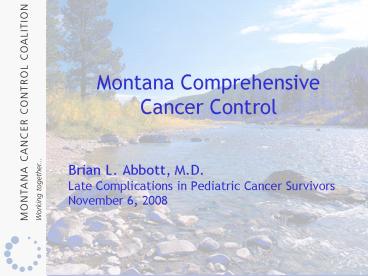Montana Comprehensive Cancer Control PowerPoint PPT Presentation
1 / 21
Title: Montana Comprehensive Cancer Control
1
Montana Comprehensive Cancer Control
- Brian L. Abbott, M.D.
- Late Complications in Pediatric Cancer Survivors
- November 6, 2008
2
Introduction
- Cure rate for childhood cancer is around 75
- 1 in 900 adults is a childhood cancer survivor
- Tremendous need for late effects programs
3
Types of Late Effects
- Growth / endocrine
- Fertility
- Cardiac
- Pulmonary
- Renal
- Second cancers
- Psycho-social
- Economic
4
Growth Hormone Deficiency
- Biggest risk cranial radiation
- (examples A.L.L., Brain tumors, Bone marrow
transplant) - Lifelong GH deficiency
- short stature
- fatigue
- high cholesterol
- Screening following growth curves, somatomedin
C, and IGF BP III - Treatable with growth hormone injections
5
Thyroid Complications
- Toxic radiation dose for thyroid is 1000 cGy
- Example Hodgkin disease
- Hypothyroidism 67 Incidence after XRT
- Thyroid cancer 16x the general population
(Hancock et al (NEJM, 1999) ) - Screening Thyroid levels monitored
6
Male Fertility
- Testes sensitive to both XRT and chemotherapy
(alkylating agents such as cyclophosphamide) - Testicular MTD
- 600 cGy (spermatogenesis)
- 2400 cGy (testosterone production)
- Recovery from alkylating agent induced
oligospermia (low sperm counts) may take years - More likely permanent after higher dose therapy
(gt 7.5 gm/m2 CTX)
7
Female Fertility
- Chemotherapy and XRT may induce loss of ovarian
function permanently - Risk of early menopause
- Five Center Study Women treated with XRT and
chemo for HD as children - 42 menopause by age 31
- Compared to 5 of controls
8
Anthracycline Cardiac Damage
- Risk of heart failure
- Cumulative dose (gt450-500 mg/m2 doxorubicin)
- Age lt 4 years at administration
- Female gender
- Mediastinal / chest radiation
- Steinhertz et al reported clinical symptoms up to
20 years following administration
9
Chemotherapy-Induced Lung Damage
- Bleomycin, BCNU, busulfan
- pulmonary fibrosis/scarring
- decrease in gas exchange ability
- Screen pulmonary function tests
- Risk reduction Discourage smoking
10
(No Transcript)
11
Neurologic Complications
- IQ impairment
- At risk populations
- Leukemia, receiving cranial XRT
- Brain tumor receiving surgery/ XRT
- Especially if under 2 years old
- Peripheral nerve damage
- From vincristine and Taxol
12
Skin Complications
- Chronic graft vs host disease of skin
- Late effect of allogeneic BMT
- Severe cases are like scleroderma
- Joint contractures, hair loss
13
Ototoxicity / Hearing Loss
- Secondary to cisplatin, which destroys hair cell
function - High frequency loss early on
- Later, loss in conversational range
14
Ocular Toxicities
- Cataract risk following steroids, XRT
- Sicca syndrome following B.M.T.
15
Second Cancers
- Predisposing factors
- Previous cancer therapies
- Chemotherapy
- Radiation
- Hereditary predispositions
- Up to 8-10 risk by 20 years
- Especially leukemia and breast cancer
16
Psycho-Social Complications
- Families always worried that relapse will occur
Sword of Damocles - Siblings may harbor resentment due to attention
given patient - Employment/insurance difficulties
- Loss of intimacy
17
Educational Issues
- Learning may be impaired due to radiation and
some types of chemotherapy - Social risk due to removal from peers and school
environment during treatment - Increased risk taking behavior due to feeling
invincible (smoking)
18
Insurance Issues
- Medical expenses due to late effects
- May be medically uninsurable
- More missed days of working with loss of job and
health insurance
19
Sohow do we address all of these issues of this
unique population???
20
Long-term follow-up clinics
- Education on survivorship issues
- Types of global evaluation
- Medical, Nursing, Social Work, Neuropsychology,
Nutrition - Additional evaluations depending on risk
- Dentistry, Endocrinology, Cardiology, Pulmonology
21
Thank you!
- Brian L. Abbott, M.D.
- Late Complications in Pediatric Cancer Survivors
- November 6, 2008

